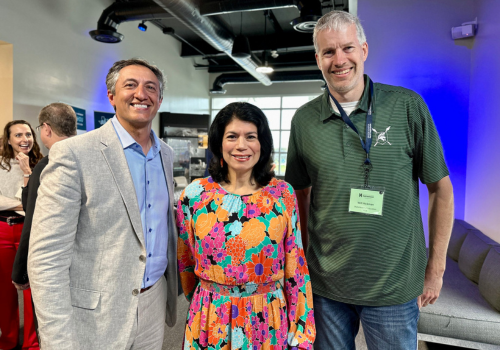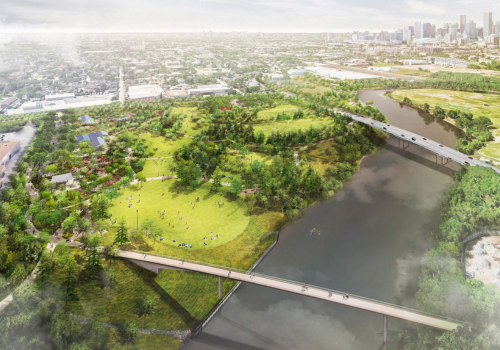5 Houston City Council Members Talk Resiliency, Education
Published Jan 31, 2020 by Maggie Martin
Providing opportunity for all and a great quality of life through quality city services was top of mind for five Houston City Council Members at the Greater Houston Partnership on Friday. They addressed a sold-out room at a Future of Texas event and included:
• Vice Mayor Pro-Tem Martha Castex-Tatum, District K
• Council Member Amy Peck, District A
• Council Member Carolyn Evans-Shabazz, Ed.D., District D
• Council Member Tiffany Thomas, District F
• Council Member Edward Pollard, District J
Here are highlights from the discussion:
Opportunity for All: Providing high-quality education to Houston students
The panel answered questions regarding the city’s role in supporting education in the city and collaborating with regional partners to improve opportunity for all.
Council Member Evans-Shabazz, a former Houston Community College Board of Trustee Chairwoman, discussed the importance of the city’s role in supporting education. She said that it is important for the city to help ensure school safety, including cleaning up communities around schools to foster a safe environment for students. Council Member Evans-Shabazz also discussed workforce development as a priority for residents in the area she represents, District D.
Council Member Thomas agreed. As a former member of the Alief ISD Board of Trustees, she said that as a business community and a city, we need to think differently about leveraging our efforts in workforce development to address Houston’s workforce gap. You can read more about the Partnership’s efforts to strengthen the region’s talent pipeline, here.
Vice Mayor Pro-Tem Castex-Tatum addressed public education in Houston. She said that it is incumbent upon the city to support all school districts in the region, and it is incumbent on city leaders to work closely with school districts, including Houston ISD, to support those districts. Vice Mayor Pro-Tem Castex-Tatum concluded, that great communities have great schools, and quality of life within communities is strongly tied to education.
Great Quality of Life: Building a more resilient Houston after Hurricane Harvey
Council Members also discussed the city’s response to Hurricane Harvey and how to build a more resilient Houston.
Council Member Pollard said that the city’s response to severe weather events needs to be multi-pronged. He called on city leaders to go into each impacted community to talk with residents and learn how flooding affects them and to learn from them how Houston should improve its mitigation efforts. He emphasized that city leaders need to convene experts from Harris county as well as the private sector to mitigate flooding issues.
Vice Mayor Pro-Tem Castex-Tatum also agreed that city leaders should look to residents and engage them for input and solutions to Houston’s flooding challenges. She urged residents and businesses to consider the members of Houston City Council as allies in finding solutions.
Quality City Services
City Council Members discussed their priorities for 2020 and improving city services.
Vice Mayor Pro-Tem Castex-Tatum established a clean district as a baseline of what the city offers. She said that combating illegal dumping is a priority in her district, District K, which has launched the #CleanStateofMind campaign. She discussed her district’s efforts to curb illegal dumping, including adding regular patrols around 22 chronic dumping spaces.
Council Member Evans-Shabazz discussed city services more broadly, and she urged residents to utilize the 3-1-1 app to report issues in real time to city services.
Homelessness in Houston
During Mayor Turner’s inaugural address, he announced plans for an initiative to continue to address Houston’s homeless challenge. During the Future of Texas panel discussion, Houston City Council Members also discussed their priorities for housing and supporting Houston’s homeless.
Council Member Evans-Shabazz focused on the homeless population that has been previously incarcerated. She outlined a priority for compassionate second chances for housing, employment and other supportive services to help Houston’s homeless.
Council Member Thomas said that homelessness goes hand-in-hand with Houston's housing crisis. She said that city leaders need to develop a more comprehensive housing plan to address this issue as well as wraparound services to move people from the streets into permanent housing.
Next Month: Future of Texas
On February 21st, the Partnership will host a second Future of Texas panel featuring Houston City Council Members.
The Future of Texas series, which is a part of our Business Resource Group (BRG), features elected officials shaping our state's future, giving Partnership members the opportunity to engage with these leaders and hear their perspectives on our city and state's most pressing issues. Learn more here.
 The Houston Report
The Houston Report




















